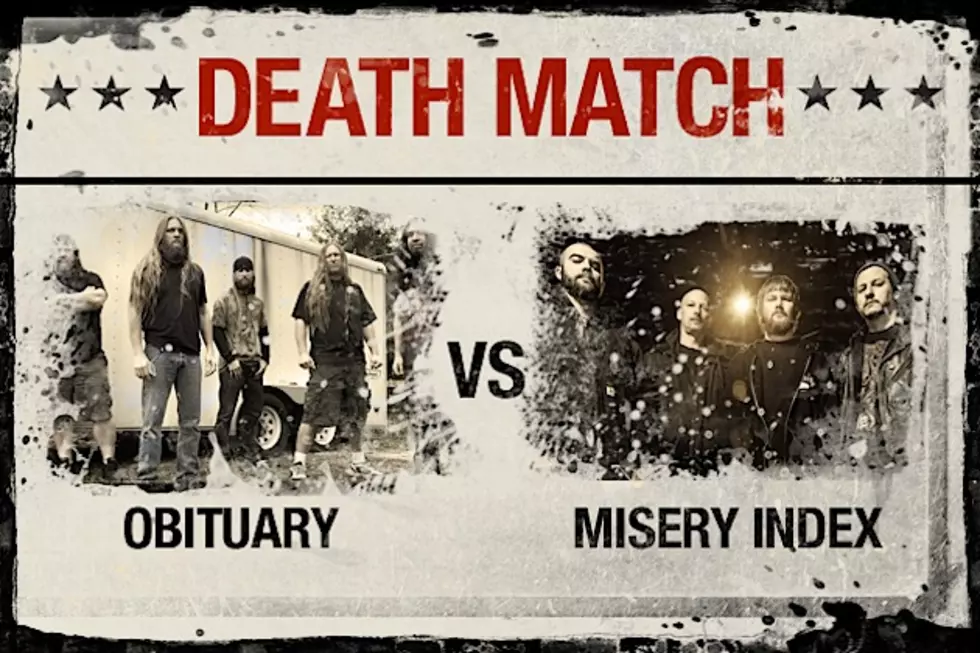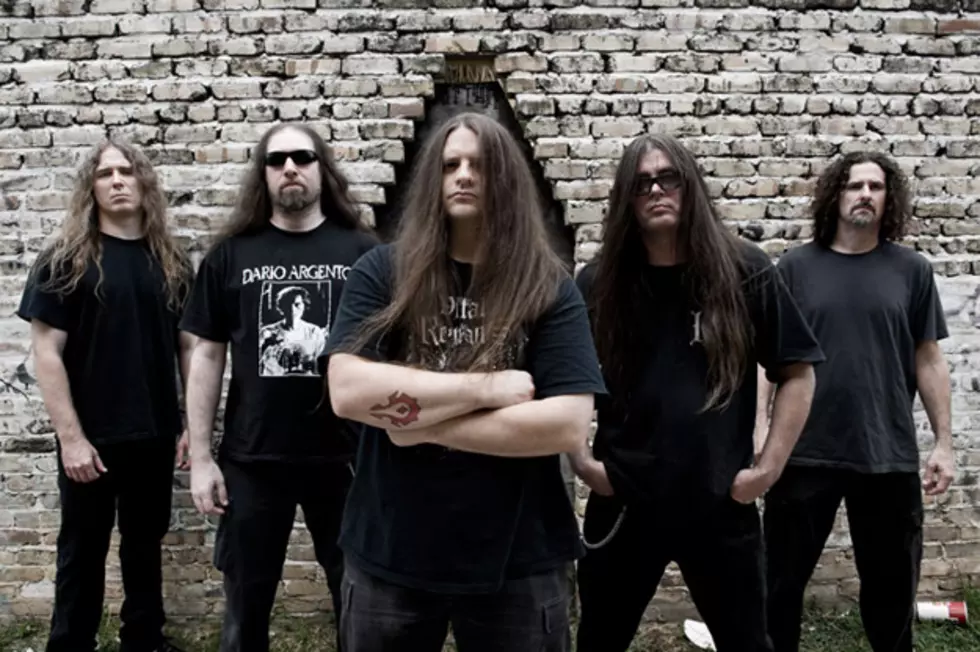
Misery Index, ‘The Killing Gods’ – Exclusive Track-by-Track Breakdown
Maryland death metal act Misery Index just released one of this year's most brutal albums, 'The Killing Gods.' The band's technical style and extremely tight compositions are enough to convert any metal fan into a new follower, but the lyrical themes Misery Index tackle is what truly sets the band apart from other extreme contemporaries. To share exactly what we mean, we're proud to premiere this exclusive track-by-track breakdown of 'The Killing Gods' penned by none other than Misery Index.
'The Killing Gods' is Misery Index's fifth full-length album and was produced by Steve Wright, who has worked with Misery Index on a regular basis since the release of 'Traitors' in 2008. Pig Destroyer guitarist Scott Hull also lent a hand in recording Adam Jarvis' drum parts, which is spotlit as one of the album's most impressive aspects.
As mentioned earlier, Misery Index's lyrics, which focus heavily on class issues and political dissidence, are a crucial part of the band's character. Check out the band's track-by-track breakdown of 'The Killing Gods' below to delve into the collective mind of Misery Index:
'The Killing Gods' is an intrinsically influenced literary and metaphysical side-step for the band to explicate real world travesty through prose. 'The Killing Gods' as a whole follows the means of human control from the metaphysical to the physical (in that order), with a brief sojourn mid record into our collective personal juxtaposition in these realms. The record revolves around themes of religious oppression, military oppression, hidden knowledge, and the intrinsic dark plume billowing in our minds like thick impenetrable smoke. It leaves the listener both digging deeper into their dark recesses and following those emotions as they extrinsically manifest. This record is a study of this bigger picture: utilizing literature, real world events, and internal observation as a means of explication. The album is generally based on the concept that humankind is never satisfied by the satisfaction of their conscious desires. They are insatiable: always requiring deeper and more.
'Faust':
This first song is broken into five parts comprising the first 15-and-a-half minutes of the record. I put the lyrics together surrounding Marshall Berman's explication of Faust in his book 'All That Is Solid Melts into Air.' Jason had presented this concept, and I kind of ran with it. Berman takes sort of a literary approach to the consequences of modernity versus a nineteenth century Enlightenment drive for progress and the growth of capitalism. He talks about it through Faust and how Faust is sort of this tragic figure in his drive to progress, he sort of destroys it at the same time. We thought that was a good literary side-step for us to still talk about our themes that we have as a band, but take it from more of a literary approach rather than being so real world about everything.
I: 'Urfaust':
The record explodes in an auditory black plume in your mind. Harmonic serpents weave and dance in your mind's eye as the proverbial stage is set for 'The Calling.'
II: 'The Calling':
Faust, frustrated with his human mental limitations, calls upon a metaphysical congregation to reveal the world’s hidden knowledge.
III. 'The Oath':
Through deep, dark introspection and contemplation, the new Faust, after obtaining the secret knowledge, plots his utilitarian world.
IV: 'Conjuring the Cull':
Faust begins the execution of his world-wide vision. The title infers a gathering of a group to be slaughtered through the use of sorcery. In this case, slaughter is used loosely as a slow death through slave labor. As his work is consummated and nearly all of the earth is upended and remade, the people who hope to benefit from the projects do not benefit at all. It was development only for sake of development. This can be interpreted in a modern context, as cites like Baltimore or Detroit and the like deal with vast sections of leftover post-industrial decay.
V: 'The Harrowing':
Faust has used the secret knowledge in fulfilling his world vision. Unbeknownst to Faust, he has done the devil’s bidding. This figure is used as an easily identifiable epitome of evil and darkness. Nonetheless, the devil is entitled to Faust’s soul. In this modernization, Faust's power grows out of control, until he can transcend the membrane of Sheol (Hell); where he goes to conquer the spiritual realm. Though he has become the conqueror and harrower of Hell, this action fulfills the pact just the same. In the spirit of Urfaust, Faust’s soul is overtaken by evil.
"Deep night now seems to fall more deeply still,
Yet inside me there shines a brilliant light.
What I have thought I hasten to fulfill.
The master's word alone has real might!"This representation of Faust is his declaration of being fully alive, and hence ready to fade into black. “Even in the dark his vision and energy go on thriving as he goes on striving, developing himself and the world around him to the very end."
'The Killing Gods':
Idols are manufactured as a means of mind control. This is especially relevant in the minds of the public as not a day goes by that a deadly opposition of idols is reinforced by mass media. Gods turn into mascots for violence, and are used as an excuse to enslave and kill. This title track observes the absurdity of the wandering flock and their Killing Gods.
'Cross to Bear':
Death metal, grind, and hardcore are genres that are viewed with a bit of a lack of seriousness for one reason or another, but, for us, this is our culture and identity. While we may conform to that attitude briefly in conversation, we take our music and culture seriously. We take the underground as seriously as some take their religions. We have our rituals, gatherings, brotherhood, sisterhood, and emotional conjurings. This song delves into the grip our culture has on our hearts and minds. It’s an obsession with death in the dark.
'Gallows Humor':
The song deals with the irony of apathy and atrocity being and trendy and passé’ form of entertainment. It’s ok not to care, and its cool not to care … and you’ll continue not to care until they swallow you whole.
'The Weakener':
Almost an extension of 'Gallows Humor,' these lyrics lash out in hatred at the apathetic fool. It also lashes out at the apathetic tendency of the self. It’s apathy as an abject in a self-love/hate relationship. This is more intrinsically influenced than Gallows. In true Misery Index form, we ask you to “cut the cord, and start the fire” within you and around you.
'Sentinels':
Drone warfare is the ultimate act of cowardice; where the political elite take civilian casualties without even leaving the office. It’s the panopticon’s far reaching hand … the long arm of the Western law … as “pilots” cheer each other’s job well done.
'Colony Collapse':
The lyrics are plainly stated here. This is the hymn of the necroexodus. As our wars outbreak like a deadly virus on the planet, and our seas tower over our coastlines, we ride our live out on this floating rock having never learned to coexist with anything.
'Heretics':
“One by one, it’s all undone, Enlightenment deceased and none shall defy!” Once again, this is a criticism of the religious right battling science and art for the sake of mental and physical enslavement; succeeding at mass manipulation by proverbially chopping heads and misinforming. To lack ignorance is to be a heretic.
Thanks to Misery Index for this fascinating read! To listen to 'The Killing Gods' in full, click here. To buy a copy of 'The Killing Gods,' click here. We highly recommend it.
More From Loudwire









